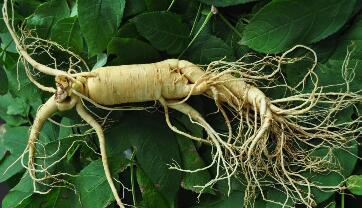Free&News

Modern Science and Ginseng 2
Phytochemistry and Pharmacology
Constitutions found in most ginseng species include ginsenosides, polysaccharides, peptides, polyacetylenic alcohols and fatty acids. Most pharmacological actions are attributed to the ginsenosides that belong to a group of compounds known a steroidal saponins, steroid molecules with attached sugar residues. More than 20 ginsenosides have been isolated.
The pharmacological profile of ginseng is broad and incompletely understood because of the many heterogeneous and sometimes opposing effects of different ginsenosides. The underlying mechanism of the ginsenosides’ action appears to be similar to that for steroid hormones. Actions on virtually every organ system have been described.
One of the most promising therapeutic uses of ginseng surrounds the regulation of carbohydrate metabolism and blood glucose. In patients with type 2 diabetes mellitus, ginseng lowered postprandial blood glucose compared to placebo when taken 40 minutes before or at the same time as a glucose challenge. In healthy subjects without diabetes mellitus, ginseng lowered postprandial blood glucose compared to placebo only if taken 40 minutes before glucose challenge.
Data from animal studies suggest that ginseng may have beneficial effects in the central nervous system. Ginsenosides prevented scopolamine-induced memory deficits in laboratory animals by increasing central cholinergic activity. They may also protect neurons from ischemic damage and facilitate learning and memory by enhancing nerve growth. The effect of ginseng on pain pathways needs further investigation. Ginsenosides had non-opioid-mediated analgesic properties in laboratory animals, but attenuated the analgesic effects of opiates. Ginsenosides appear to modulate neurotransmission through Gamma-aminobutyric acid (GABA), and by inhibiting neurotransmitter reuptake.
The results of investigation on the cardiovascular effects of ginseng are often contradictory, depending on the compounds tested and the organ system in which they are tested. Stimulation of endogenous nitric oxide release has been implicated in the cardiovascular and antioxidant effects of ginsenosides. In humans, normal doses of ginseng did not appear to affect blood pressure and heart rate, although extremely high doses were associated with hypertension. Ginseng may protect against myocardial reperfusion injury. In a preliminary study, cardioplegia solution containing ginseng extract improved the myocardial function in patients having mitral valve surgery.
Ginsenosides have anticarcinogenic and immunomodulatory effects. Several individual ginsenosides suppressed tumor cell growth, induced cell differentiation, regulated programmed cell death, and inhibited metastasis. Results of cohort study showed that ginseng consumers had lower risk for several different types of cancer compared to those who did not consume ginseng, suggesting that ginseng may have non-organ-specific anticarcinogenic effects. Ginsenosides also enhanced humoral and cell-mediated immune responses in laboratory animals and potentiated the response to vaccination in humans.

International acupuncture education






